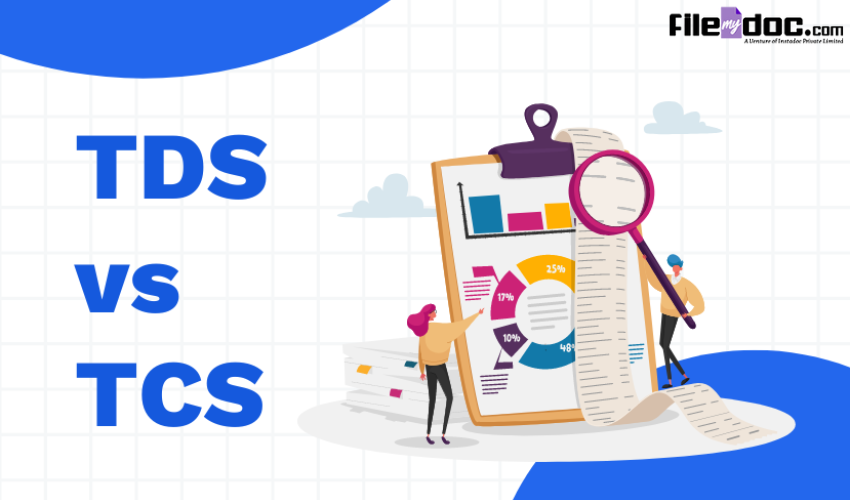TDS (Tax Deducted at Source) is a system under which a specified percentage of tax is deducted by the person responsible for making certain specified payments (such as salary, commission, professional fees, interest, rent, etc.) to the recipient of the payment and deposited to the government on behalf of the recipient.

TCS (Tax Collected at Source) is a system under which a specified percentage of tax is collected by the seller at the time of sale of certain specified goods (such as alcohol, tobacco, scrap, etc.) and deposited to the government on behalf of the buyer.
In summary, TDS is a tax deduction at the source of payment, while TCS is a tax collection at the source of the sale.
What are TDS and TCS with examples?
- TDS (Tax Deducted at Source) is a system under which a specified percentage of tax is deducted by the person responsible for making certain specified payments (such as salary, commission, professional fees, interest, rent, etc.) to the recipient of the payment and deposited to the government on behalf of the recipient.
- For example, An employee receives a salary of Rs. 50,000 per month and the TDS rate applicable on salary income is 10%. The employer will deduct Rs. 5,000 (10% of Rs. 50,000) as TDS and deposit it with the government on behalf of the employee. After deducting TDS, the employee will receive the remaining Rs. 45,000 as net salary.
- TCS (Tax Collected at Source) is a system under which a specified percentage of tax is collected by the seller at the time of sale of certain specified goods (such as alcohol, tobacco, scrap, etc.) and deposited to the government on behalf of the buyer.
- For example, A customer buys alcohol worth Rs. 10,000 and the TCS rate applicable on the sale of alcohol is 5%. The seller will collect Rs. 500 (5% of Rs. 10,000) as TCS and deposit it with the government on behalf of the buyer. The customer will pay Rs. 10,500 for the alcohol, including the TCS of Rs. 500.
Is TCS applicable if TDS is deducted?
It depends on the nature of the transaction and the type of payment being made. There can be cases where both TDS and TCS are applicable on a single transaction, or TDS or TCS may be applied alone.
For example, if an individual receives salary income and also buys goods that attract TCS, then both TDS and TCS will be applicable on the same transaction. In this case, TDS will be deducted from the salary income, and TCS will be collected on the purchase of goods.
In conclusion, whether TCS is applicable or not if TDS is deducted depends on the specifics of the transaction and the nature of the payment.
What are TDS and TCS amounts?
TDS (Tax Deducted at Source) amount is the percentage of the specified payment that is deducted by the person responsible for making the payment (such as salary, commission, professional fees, interest, rent, etc.) and deposited to the government on behalf of the recipient. The TDS rate is determined by the government and is specified under the Income Tax Act, of 1961. The TDS rate can vary based on the type of payment and the category of the recipient (such as individual, HUF, firm, etc.).
For example, if an employee receives a salary of Rs. 50,000 per month and the TDS rate applicable on salary income is 10%, then the TDS amount will be Rs. 5,000 (10% of Rs. 50,000).
TCS (Tax Collected at Source) amount is the percentage of the specified goods that is collected by the seller at the time of sale and deposited to the government on behalf of the buyer. The government determines the TCS rate which is specified under the Income Tax Act, of 1961. The TCS rate can vary based on the type of goods being sold.
For example, if a customer buys goods worth Rs. 10,000 and the TCS rate applicable on the sale of goods is 5%, then the TCS amount will be Rs. 500 (5% of Rs. 10,000).
Who will deduct TDS and TCS?
TDS (Tax Deducted at Source) is deducted by the person responsible for making certain specified payments (such as salary, commission, professional fees, interest, rent, etc.). This person is called the “deductor”. In most cases, the deductor is an employer in the case of salary income, a bank in the case of interest income, and a person making payment in the case of rent, professional fees, commission, etc.
TCS (Tax Collected at Source) is collected by the seller at the time of sale of certain specified goods (such as alcohol, tobacco, scrap, etc.). The seller is responsible for collecting TCS and depositing it with the government on behalf of the buyer.
In summary, TDS is deducted by the deductor, and the seller collects TCS.
What is the difference between TDS and TCS in GST?
- TDS (Tax Deducted at Source) and TCS (Tax Collected at Source) are provisions under the Goods and Services Tax (GST) regime in India for collecting taxes from the buyer at the source of the transaction.
- TDS applies to specific categories of suppliers, such as government entities, and requires the recipient of the supply to deduct a specified percentage of the payment as tax, which is then deposited with the government.
- TCS, on the other hand, applies to specific categories of goods such as alcoholic liquor for human consumption and requires the e-commerce operator to collect a specified percentage of the sale value of goods as tax, which is then deposited with the government.
In summary, TDS is deducted by the recipient of the supply and TCS is collected by the e-commerce operator.























